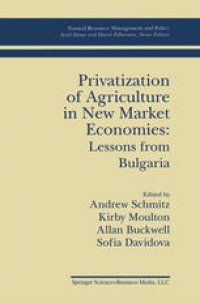
Ebook: Privatization of Agriculture in New Market Economies: Lessons from Bulgaria
Author: S. Davidova A. Buckwell (auth.) Andrew Schmitz Kirby Moulton Allan Buckwell Sofia Davidova (eds.)
- Tags: Agricultural Economics, Environmental Economics, Agriculture
- Series: Natural Resource Management and Policy 6
- Year: 1994
- Publisher: Springer Netherlands
- Edition: 1
- Language: English
- pdf
The idea for this book began in Sofia, Bulgaria in September, 1992 when we met to plot a course for our University Affiliations project which had been recently funded by the U.S. Infonnation Agency. We believed that worldng on the book would provide valuable learning experiences for all the cooperators, and that the book itself would make a useful contribution to understanding the economic transition process and its policy implications. We recognized that a project of this nature would require the skills and knowledge of many people. To those 34 additional contributors to this volume, and to the many other friends, colleagues, and experts who gave generous advice, we give our sincerest thanks. We also acknowledge with thanks the support of several organizations to a reality. Much of the that transfonned this book from an idea research reported here was a major part of an educational project funded by the University Affiliations Program of the U.S. Information Agency. The project linked the University of California, Berkeley, Wye College of London University, and the Research Institute of Agricultural Economics, Sofia, in a cooperative effort to improve the quality of policy analysis. The research provided hands-on experience necessary for effective teaching in this area.
This book is about economic transformation in agriculture and the adjustments needed in public and private strategies to facilitate it. The book uses theory from the social and physical sciences and practical experience gained throughout the world to recommend strategies that are generally applicable to new market economies in transition.
Bulgaria is used as a case example because it provides an empirical reference of interest because of its diversity, its massive restructuring, and its precollectivization history as an efficient sector. The book also provides a means for coordinating output from a variety of projects currently active in Eastern Europe.
This book is about economic transformation in agriculture and the adjustments needed in public and private strategies to facilitate it. The book uses theory from the social and physical sciences and practical experience gained throughout the world to recommend strategies that are generally applicable to new market economies in transition.
Bulgaria is used as a case example because it provides an empirical reference of interest because of its diversity, its massive restructuring, and its precollectivization history as an efficient sector. The book also provides a means for coordinating output from a variety of projects currently active in Eastern Europe.
Content:
Front Matter....Pages i-xvi
Agricultural Reform....Pages 2-22
Agriculture: Diversification and Productivity....Pages 23-53
Land Reform: How Will the Future Look?....Pages 55-73
Land Markets and Tenure....Pages 75-85
Disruption and Continuity in Bulgaria’s Agrarian Reform....Pages 87-117
Political Economy of Reform in Bulgarian Agriculture....Pages 119-148
Food Consumption During Economic Transformation....Pages 149-167
Agriculture and the Environment....Pages 169-186
Price Policies During Transformation....Pages 187-211
Agricultural Trade: Post-Reform Challenges....Pages 213-233
The Grain Sector: Wheat is King....Pages 235-262
Wine and the Politics of Survival....Pages 263-282
The Cotton Industry in Decay....Pages 283-312
Liquidation Committees, Land Commission and No Fruit....Pages 313-333
Improving Markets and Marketing....Pages 335-355
Developing Human Capital....Pages 357-374
Credit for Agriculture During the Transition....Pages 375-401
Credit Subsidies to Support Agriculture....Pages 403-418
Agricultural Transformation: An Overview....Pages 419-428
Back Matter....Pages 429-439
This book is about economic transformation in agriculture and the adjustments needed in public and private strategies to facilitate it. The book uses theory from the social and physical sciences and practical experience gained throughout the world to recommend strategies that are generally applicable to new market economies in transition.
Bulgaria is used as a case example because it provides an empirical reference of interest because of its diversity, its massive restructuring, and its precollectivization history as an efficient sector. The book also provides a means for coordinating output from a variety of projects currently active in Eastern Europe.
Content:
Front Matter....Pages i-xvi
Agricultural Reform....Pages 2-22
Agriculture: Diversification and Productivity....Pages 23-53
Land Reform: How Will the Future Look?....Pages 55-73
Land Markets and Tenure....Pages 75-85
Disruption and Continuity in Bulgaria’s Agrarian Reform....Pages 87-117
Political Economy of Reform in Bulgarian Agriculture....Pages 119-148
Food Consumption During Economic Transformation....Pages 149-167
Agriculture and the Environment....Pages 169-186
Price Policies During Transformation....Pages 187-211
Agricultural Trade: Post-Reform Challenges....Pages 213-233
The Grain Sector: Wheat is King....Pages 235-262
Wine and the Politics of Survival....Pages 263-282
The Cotton Industry in Decay....Pages 283-312
Liquidation Committees, Land Commission and No Fruit....Pages 313-333
Improving Markets and Marketing....Pages 335-355
Developing Human Capital....Pages 357-374
Credit for Agriculture During the Transition....Pages 375-401
Credit Subsidies to Support Agriculture....Pages 403-418
Agricultural Transformation: An Overview....Pages 419-428
Back Matter....Pages 429-439
....